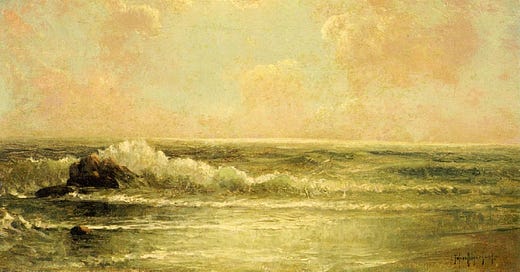[Image: “Seascape with Pines and Overhanging Clouds,” 1901, Julian Onderdonk, public domain]
New subscribers, you are very welcome. I am glad you’re here.
Right up front, let’s address silence. A necessity of any life that wants to be in any way contemplative—whether you’ve already hit the road for a monastery or have found your interior castle in the heart of the city—silence has to come from somewhere. You have to take it out of the day, take it out of other things. Something will have to be sacrificed for it.
This is as true of your life as it is of mine. So I never want what happens here to add to the noise of your life (or of mine). It may help to think of these letters, then, as occasional dispatches from the front lines of the fight for silence. If you ever have to turn them off to seek your silence, I wll never fault you for it, as I hope you’ll not fault me for reaching out only rarely. My best friends have always known I can be like this—elusive—and that it’s not from coldness, but from only too much to say. And who knows why, perhaps because I am lucky (or blessed), they tolerate me anyway.
The best writing always invites you to a friendship of the mind. This is why I continue in a noisy, overly vocal age to love arts and letters, especially books, especially works of fiction. They have never meant noise to me, always signal: meaning sent from one mind to another. They are a form of (small-c) communion.
In the art of fiction, more than in any other, we come to understand what the outer and inner worlds of others are like. Your experience can be rendered visible to me and mine to you (if we’re diligent and skilled enough to render it justice, line by line). Even if, at the end, we don’t agree on the conclusions we draw from experience, we at least have a better comprehension of why. From such places we can seek—and perhaps even find—peace, because we can see equal dignity as a matter of practical fact.
So far from being the frivolous diversion its early (and late) critics have found it, good fiction lends itself to the hard but necessary work of peacemaking, without which good luck having a society at all. Good fiction lends itself, too, to fruitfulness, by which I just mean human action that accomplishes good and leads to good, as in “by their fruits you shall know them.”
Human action, distilled experience, compressed into comprehensible form on the page, is revealed to be inherently meaningful. Will, heart, spirit, choice, freedom: frame the issue how you like, you’ll come back to this irreducible reality, as long as you have human action clearly in your view.
Works that try to unmask our actions as mere meaningless, random, conditioned expressions of behaviorism render themselves radically unreadable. Sure, you can acquire a taste for such works, if doing so seems somehow necessary to you: or you can pretend to acquire it, anyway, and keep up the pretense for a good while. And the rewards and kudos you’ll get for your stylish despondency—mostly from those who benefit from keeping you despondent—will help in that effort, no question.
But sooner or later, materialist naturalism will hollow you out and create a channel in you that flows only to the sea of despair.
I am interested in cutting other channels to other oceans.
This is why I’ve become involved in the founding of a literary imprint, Luminor, a branch of Word on Fire Publishing. You can read a little more about our aims and ethos here:
I hope that together we can throw greater light on the complex, unpredictable, and irreducible human experience, with stories of and for our time that illuminate and are illuminated by a Catholic vision of reality. Joy and sorrow are mingled in this vision, yet without confusion and without forgetting the time when every tear will be wiped away. Truth and error grow together in the world like weeds and wheat: Yet for this very reason, to tell and to hear how it happens is to be on the side of truth.
Not every work Luminor publishes will necessarily be “contemplative realist” as such, though I myself remain a contemplative realist writer of fiction: In a sense, there are as many ways to be a “Catholic writer” as there are Catholic writers, contemplative realism being just a loosely associated “school of fish” within that swim. And as Robert Penn Warren notices in his essay “Pure and Impure Poetry,” even those critics and artists who identify with a particular aesthetic school in theory won’t always appear to be unambiguous exponents of that school in practice. The inherent difficulties of definition, and the almost infinite complexities of art, are at play in all this.
But Luminor is, because I’m leading it, very much open to submissions of contemplative realist fiction, and I hope some of you reading now will be generous enough to give me the chance to consider your works, to whatever school you subscribe.





I can’t wait to see (and read!) what this new venture brings!!
Congratulations on the new venture. I only wish that I had something currently on hand to submit to you!